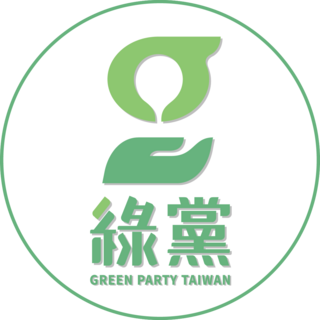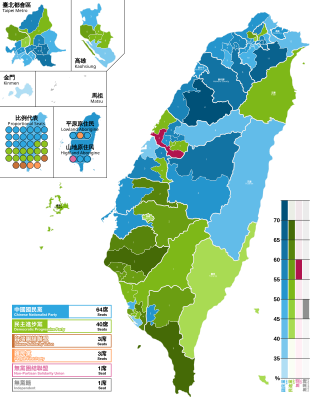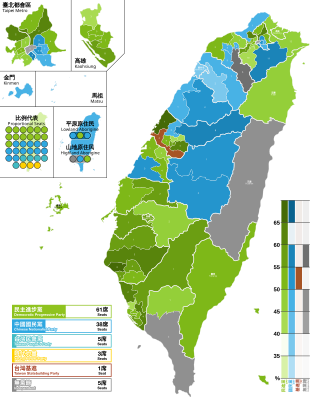
Taiwan, officially the Republic of China (ROC), is governed in a framework of a representative democratic republic under a five-power system first envisioned by Sun Yat-sen in 1906, whereby under the constitutional amendments, the President is head of state and the Premier is head of government, and of a multi-party system. Executive power is exercised by the Executive Yuan. Legislative power is vested primarily in the Legislative Yuan. The judiciary is independent of the executive and the legislature. In addition, the Examination Yuan is in charge of validating the qualification of civil servants, and the Control Yuan inspects, reviews, and audits the policies and operations of the government.

The president of the Republic of China, commonly known as the president of Taiwan, is the head of state of the Republic of China (Taiwan) as well as the commander-in-chief of the Republic of China Armed Forces. The position once had authority of ruling over Mainland China, but its remaining jurisdictions has been limited to Taiwan, Penghu, Kinmen, Matsu, and other smaller islands since the conclusion of the Chinese Civil War.

The People First Party is a centrist or centre-right political party in Taiwan.

Green Party Taiwan is a political party in Taiwan established on 25 January 1996. Although the party is sympathetic to Taiwanese nationalism and shares a number of centre-left positions with the Pan-Green Coalition, the party emphasizes campaigning primarily on social and environmental issues. The party is not a member of, and should not be confused with, the Pan-Green Coalition. Green Party Taiwan is a member of the Asia Pacific Greens Federation and participates in the Global Greens.

The Legislative Yuan is the unicameral legislature of the Republic of China (Taiwan) located in Taipei. The Legislative Yuan is composed of 113 members, who are directly elected for four-year terms by people of the Taiwan Area through a parallel voting system.

You Si-kun, also romanized Yu Shyi-kun, is a Taiwanese politician. He was one of the founding members of the Democratic Progressive Party (DPP), and is known to be a strong advocate of Taiwan independence. He led the DPP as chairman from 2006 to 2007 and served as Premier from 2002 to 2005.
The Executive Yuan is the executive branch of the government of the Republic of China (Taiwan). Under the amended constitution, the head of the Executive Yuan is the Premier who is positioned as the head of government and has the power to appoint members to serve in the cabinet, while the ROC President is the head of state under the semi-presidential system, who can appoint the Premier and nominate the members of the cabinet. The Premier may be removed by a vote of no-confidence by a majority of the Legislative Yuan, after which the President may either remove the Premier or dissolve the Legislative Yuan and initiate a new election for legislators.

The Control Yuan is the supervisory and auditory branch of the government of the Republic of China, both during its time in mainland China and Taiwan.
In Taiwan, parliamentary elections are held every four years to elect the 113 members of the Legislative Yuan, the unicameral legislature of Taiwan. The current electoral system was introduced in 2008. The constitutional amendments of 2005 extended term length from three to four years, reduced seat count from 225 to 113, and abolished the National Assembly, originally another governmental organ equivalent to a chamber of parliament.
The elections in Taiwan each held every four years, typically in January and November. Since 2012 the previously eleven types of elections in Taiwan have been unified into general and local elections. There may also be by-elections. Electoral systems include first-past-the-post, proportional representation, single non-transferable voting, and a parallel mixture of the above.

The President of the Legislative Yuan is the presiding officer of the Legislative Yuan of the Republic of China. The incumbent president is Han Kuo-yu, a legislator from the Kuomintang.

Legislative elections were held in Taiwan on 12 January 2008 to elect the members of the Legislative Yuan. It was the first Legislative Yuan election after the constitutional amendments of 2005, which extended term length from three to four years, reduced seat count from 225 to 113, and introduced the current electoral system.

The 7th Legislative Yuan was a term of members of the Legislative Yuan of Taiwan from 1 February 2008 to 31 January 2012. Members were elected to constituency (district) seats in the 12 January 2008 legislative election. The next legislative election took place in January 2012.

The 2012 Taiwanese legislative election was held on 16 January 2012 for all 113 seats in the Legislative Yuan. For the first time, legislative elections were held simultaneously with the presidential election. Elected parliamentarians formed the fifteenth Legislative Yuan session since 1946, when the current constitution came into effect. Voting took place on 14 January 2012 between 08:00 and 16:00 local Taipei time at 14,806 polling stations nationwide.

Su Jia-chyuan is a Taiwanese politician of the Democratic Progressive Party (DPP).

Legislative elections were held in Taiwan on 16 January 2016 to elect all 113 members in the Legislative Yuan, alongside presidential elections. The Democratic Progressive Party (DPP) led by Tsai Ing-wen, who also won the presidential election on the same day, secured a majority for the first time in history by winning 68 seats. The ruling Kuomintang (KMT) lost both the presidency and its legislative majority and returned to the opposition.

The 9th Legislative Yuan was a term of members of the Legislative Yuan of Taiwan, from 1 February 2016 to 31 January 2020. Members were elected in the 16 January 2016 legislative election. The ruling Democratic Progressive Party control the Legislative Yuan for the first time. The next legislative election was held on January 11, 2020 for the Tenth Legislative Yuan.

Chiu Chih-wei is a Taiwanese politician and a member of the Legislative Yuan. A Hakka descent, he is a member of the Democratic Progressive Party. He has a Ph.D. degree from the National Sun Yat-sen University (NSYSU). He served as Kaohsiung's chief of bureau of civil affairs between 2007 and 2011. He was elected into the Legislative Yuan representing Kaohsiung 2nd district since 2012. He was reelected in 2016.

Legislative elections were held in Taiwan on 11 January 2020 for all 113 seats to the Legislative Yuan concurrently with the 15th presidential election. The term of the Legislative Yuan began on 1 February 2020.

The Taiwan People's Party (TPP) is a centre-left political party in the Republic of China (Taiwan). It was formally established on 6 August 2019 by Ko Wen-je, who serves as its first and current chairman. The party considers itself as an alternative third party to both the Democratic Progressive Party and Kuomintang.


































